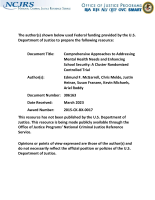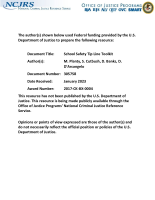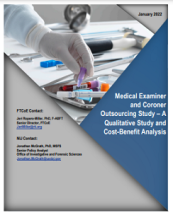Cost analysis
Veterans Moving Forward: Process and Impact Evaluation Results of the San Diego County Sheriff's Department VMF Program
A method to generate capture baits for targeted sequencing
Electrochemical and mass spectrometry methods for identification of gunshot residues (GSR) in forensic investigations
Comprehensive Approaches to Addressing Mental Health Needs and Enhancing School Security: A Cluster Randomized Controlled Trial
School Safety Tip Line Toolkit
Formative Evaluation and Evaluability Assessment of a Family Justice Center
What works to reduce violent gun crime in focused deterrence initiatives? Estimating the effect of services and enforcement in facilitating desistence among prolific violent offenders in Tampa
Integrated Law Enforcement and Mental Health Responses in Tucson: An Impact and Cost Benefit Analysis
Cost-Benefit Analysis Tool for Labor Expenditure Associated With Sexual Assault Kit Processing Workflows
Rethinking revocations: A study to examine the effects of a coaching model on improving outcomes
Cultivating Healing by Implementing Restorative Practices for Youth: Protocol for a Cluster Randomized Trial
National Motor Vehicle Title Information System Cost-Benefit Analysis
Measuring the Economic Benefits of Developmental Prevention Programs (From Crime and Justice: A Review of Research, Volume 28, P 347-384, 2001, Michael Tonry, ed. -- See NCJ-192542)
Medical Examiner and Coroner Outsourcing Study: A Qualitative Study and Cost-Benefit Analysis
School Safety and School-Based Mental Health Services in a Large Metropolitan School District
Validation of Half-Reaction Amplification Using Promega PowerPlex© 16
Crime Scene Documentation: Weighing the Merits of Three-Dimensional Laser Scanning
Desistance From Crime: Implications for Research, Policy, and Practice
Most scholars would agree that desistance from crime – the process of ceasing engagement in criminal activities – is normative. However, there is variability in the literature regarding the definition and measurement of desistance, the signals of desistance, the age at which desistance begins, and the underlying mechanisms that lead to desistance. Even with considerable advances in the theoretical understanding of desistance from crime, there remain critical gaps between research and the application of that research to practice.
See the YouTube Terms of Service and Google Privacy Policy
NIJ Multisite Impact and Cost-Efficiency Evaluation of Veterans Treatment Courts, Fiscal Year 2022
Deadline Notice
The deadline for the funding opportunity discussed in this video has passed.
See the YouTube Terms of Service and Google Privacy Policy
Assessment of the Added Value of New Quantitative Methodologies for the Analysis of Surface Soils in Forensic Soil Comparisons
Locating unregistered and unreported data for use in a social science systematic review and meta-analysis.
Tracking Time and Resources Associated with Systems Change and the Adoption of Evidence-Based Programs: The "Hidden Costs" of School-Based Coaching
“All reentry is local”: Evaluating a Strategy to Reenter State Prisoners through Local Correctional Systems
School Safety Implementation Challenges - Roundtable Discussion, NIJ Virtual Conference on School Safety
On February 16-18, 2021, the National Institute of Justice hosted the Virtual Conference on School Safety: Bridging Research to Practice to Safeguard Our Schools. This video presents a roundtable discussion from the conference.
See the YouTube Terms of Service and Google Privacy Policy








